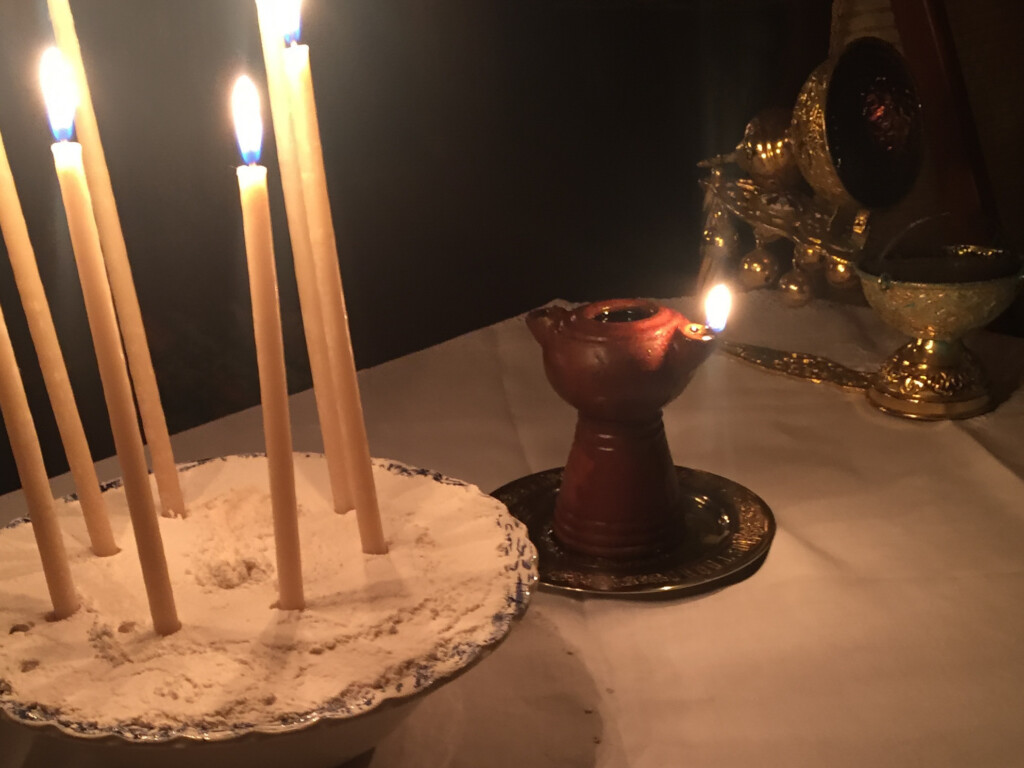
14Are any among you sick? Let them call for the presbyters of the Church to pray over them and anoint them with oil in the Name of the Lord.15The prayer of faith will heal those who are sick and the Lord will raise them up. If they have committed sins, they will be forgiven.
(James 5:14-15)
The theme of oil which runs through the Bridegroom Matins services of Holy and Great Tuesday and Wednesday. On Monday evening we focused on the Parable of the Ten Virgins and on Tuesday evening we focused on the Anointing of the Lord by the penitent harlot. On Wednesday Evening (i.e. Holy and Great Thursday), we normally perform the Sacrament of Holy Unction – Euchelaion in Greek (Prayer of Oil). As can be seen from the quotation from the Epistle of James (believed to date to A.D. 47), above, this sacrament was being performed from the very earliest days of the Church. It is performed for the healing of both soul and body.
In the sacrament of Holy Unction olive oil is sanctified through the reading of seven prayers of blessing, accompanied by seven readings from the Epistles and seven from the Holy Gospels. The service is ideally performed by seven priests, though this is not mandatory.
After the blessing of the oil, the priests hold the Holy Gospel over the head of the sick person while reciting a prayer of healing and forgiveness. They are then anointed with the holy oil for the healing of every physical and spiritual sickness.
Who can receive Holy Unction?
As one of the sacraments of the Church, holy oil blessed in this manner is reserved for baptised Orthodox Christians in good standing.
When is the sacrament of Holy Unction performed?
At the Church of the 318 Holy Fathers, the sacrament of Holy Unction is performed on Holy Wednesday, as is the custom in most Greek Orthodox parishes. This is done in remembrance of the woman who poured out ‘a pound of ointment of spikenard, very costly, and anointed the feet of Jesus, and wiped his feet with her hair’ (John 12:3), who is commemorated in the hymns of Holy Wednesday.
The sacrament may also be performed throughout the year, as and when needed — i.e., whenever one who is sick ‘calls on the presbyters of the Church’, as St James the Apostle says above.
Can I take Holy Unction home with me?
While it has become common practice for people to take holy oil with them at the end of the Holy Wednesday service, it should be pointed out that the sacramental role of the priest in the service is not limited only to the blessing of the oil. The anointing of the sick person is also a sacramental act, and should therefore be performed by the priest. Taking the holy oil home for private use is therefore inappropriate in most cases, and the practice is discouraged by our Archdiocese.
Holy Unction and Confession
There are some who claim that, because the Unction service contains a prayer of absolution, that participation in this service renders the sacrament of Confession unnecessary. This is, of course, not true.
The whole earth is full of Your mercy, O Master. Therefore, as we are mystically anointed with holy oil this day, in faith we implore You that we may be shown Your mercy, which is beyond understanding.
(Canon of the Service of Holy Unction, first ode, Great Wednesday evening)